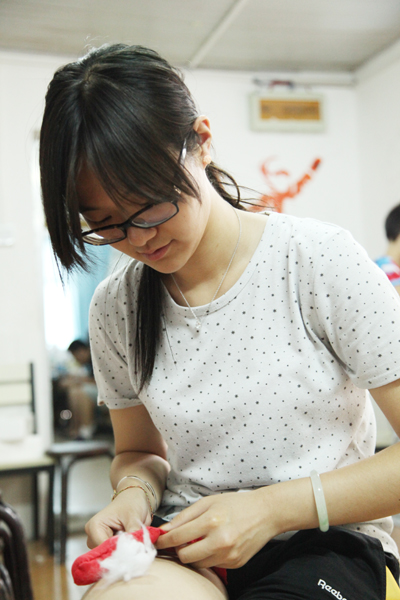
It is not the first time that Wang Yuchen has become a volunteer teacher. But for the first time, she is asking herself, "Do the children really need my help?"
Unlike her peers who are busy doing internships to pave the way for their future, the 21-year-old's career path has been guaranteed since she was accepted into the eight-year medical learning program in Peking University three years ago.
 |
|
Wang Yuchen makes the costumes for the children in the community center of Lengquan village in northwest suburban Beijing on July 20, 2012. [Photo by Fan Zhen/chinadaily.com.cn] |
Wang has dedicated almost all her free time to charity work and public services, trying to do her bit to make the world a better place.
It was not before long she found herself caught in a less than ideal reality.
"College students are sent to be volunteer teachers for migrant workers' children to earn enough credits at school. Not all of them go there on their free will," Wang said.
Some universities like Peking University guarantee the students the entrance to graduate studies if they "volunteer" in the appointed schools in underdeveloped areas for one year.
"But nobody plans it as a whole. Sometimes the students teach the children the same thing that another batch of 'temporary teachers' has already taught."
"Children get tired and feel treated like tools," Wang said. "You can’t fool the kids."
It is the very reason that has led Wang to Dean D'Art. She values this summer camp because it is organized by the students themselves and it aims to develop into a long-term activity.
Surrounded by groups of children and kindred spirits, Wang feels at home.
"We teach them to sing, draw and perform. It is not the knowledge that we want them to acquire but confidence, the courage to stand on stage and to live full lives."
Although Wang wishes for the best, things do not always work out as one might hope.
When Wang was making the costumes for the children's premiere, a six-year-old boy went by, stopped and exclaimed in a low voice, "These clothes are so new and nice. Why are you cutting them to make costumes?"
Another three children were drawn by the remarks and murmured after seeing the clothes. "What a waste."
Wang was struck by their response, and did not know what to say.
The clothes the children did not want to waste were donated by college students and some were of famous brands.
Wang never thought the waste from her schoolmates might mean a different thing to the children in the village.
"We came here to tell them they can be just one of us in the future but we accidentally revealed that we are so different from them," Wang also pointed to the iPads and iPhones the volunteers left on the table.
"Do you know what kind of chance these children have to go to college?" Wang finds it difficult to reconcile the rich education environment which she and her school friends were brought up with in comparison to these children.
"I'm not saying children of migrant workers don't stand the chance. It's just getting harder to edge oneself into the competitive big city."
"So what's the use of making a dream for them if we cannot promise it will come true?" Wang said. "Do they really need our help? Or how should we help them?"
Wang's question hung in the air, unanswered. In the background the echo of children's laughter can be heard coming from the performance class next door.
Contact the writer at [email protected]